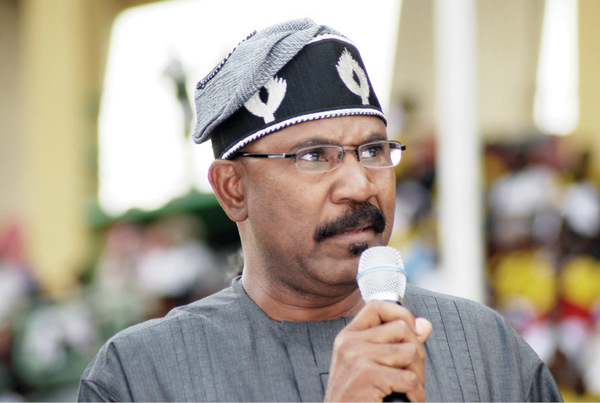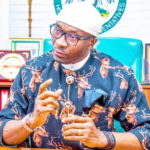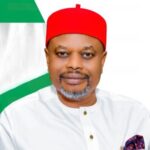Earlier in the then-new year, 2022, the Nigerian Communications Commission confirmed that MTN Nigeria and Mafab Communications Limited had paid $273.6m each for the Fifth Generation spectrum licence.
The Executive Vice Chairman of the NCC, Umar Danbatta, confirmed the payment in February as the deadline set for the two winners of the spectrum auction elapsed.
The “Provisional winners of the 3.5 Gigahertz spectrum licence, MTN Communications Nigeria Plc and Mafab Communications Limited, have made their full payment of $273.6m each for the 5G Spectrum license to the Nigerian Communications Commission”, Danbatta said via a press statement in February.
Also in the year, the Minister of Science Technology and Innovation (STI), Senator Adeleke Mamora, said despite less funding and other challenges, the ministry made enormous achievements since he took over as minister on July 14, 2022.
The minister said this in Abuja during an interactive session with reporters on the achievements of the ministry in the period under review.
Consumers reject NAICOM’s directive on 3rd party insurance, call for reversal
My critics have mischievous intentions – Obaseki
He also solicited for more funding for Research and Development (R&D) in the country to boost technological advancement.
“Research activities require a lot of funding and there has to be a way to make that funding possible. The African Union (AU) had set up a 2% of GDP for member countries for R&D and the truth is that until and unless we give priority to R&D, it will be difficult for us to get to where we want to be in terms of socio-economic development. We need R&D to move forward,” he said.
Mamora commended President Muhammadu Buhari for committing 0.5% of Nigeria’s GDP to Research and Development which, he said, is an improvement from previous years.
The minister also said as a result of the funding constraints, the ministry had prioritised dropping of wastages and avoiding duplication.
Also, the executive vice chairman/chief executive, National Agency for Science and Engineering Infrastructure (NASENI), Prof. Mohammed Sani Haruna, disclosed during the year that the agency’s target is to contribute 50 megawatts of solar energy to Nigeria’s electricity by 2023.
Prof. Haruna said the agency already had achieved about 21 megawatts per annum with installed capacity through its NASENI Solar Energy Limited (NSEL), a manufacturing plant located in Karshi, Abuja.
He said the plant is now implementing its plan to double that capacity to move its production capacity to 50 megawatts to bridge the gap of over 80 per cent of imported substandard solar products which have flooded Nigerian markets.
The federal government, during the year, approved a national policy on welding and welding-related fields and its urgent implementation as part of the efforts to fast track industrialisation and sustainable development.
The Minister of Science, Technology and Innovation, Dr (Sen.) Adeleke Olorunnimbe Mamora, revealed the policy approval in a statement by the ministry.
The policy, according to the minister, will arrest the present situation where many Nigerians have to outsource welding jobs due to the emphasis placed on foreign welding certification.
He stated that the recently approved policy is in line with the implementation of the Presidential Executive Order NO.5 which will boost local content in production.
This, he added, will give the desired credence to Nigeria’s certification and accreditation outcomes.
Also, the federal government presented patent certificates of registration to 19 Nigerian researchers, investors and innovations to encourage them to make their works world standard in the area of innovation and research activities.
Dr Mamora reiterated that intellectual property in the form of technological innovation has today become the basis of international power structures.
“The speedy industrialisation of the country and its economic growth depends largely on the efforts of our researchers. Our motivation system managers should be conversant with intellectual property issues,” he also stated.
He said to strengthen the weak intellectual properties (IP) regulation, NATOP collaborated with World Intellectual Property Organization (WIPO) in 2006 and also established intellectual property technology transfer offices to encourage IP awareness in Nigeria.
Data governance will ensure maximum value derivation from digital economy – DG NITDA
As data affects how we make decisions on the path to creating a sustainable future, especially in the post-COVID-19 era and the emerging challenges, the Director General, National Information Technology Development Agency (NITDA), Kashifu Inuwa, has said the governance of data and how Nigeria as a country seeks to position herself in this agenda is key to ensuring that maximum value is derived, and provide the needed support for the thriving innovation ecosystem.
Speaking on the Draft, Inuwa noted that the strategy seeks to create an enabling environment for access to data to develop the digital economy, adding that it also supports the development of data infrastructures, data for the public good, open government data, data privacy and protection, and upskilling Nigerians in both public and private sectors.”
Also during the course of the year’s activities, NCC detected at various times dangerous malware that could steal the financial information of Nigerian phone users.
The recent one being Xenomorph, which installs Trojans in banking apps on the Android platform to steal login details, raid bank accounts, and read the user’s SMS, has been flagged by the Nigerian Communications Commission’s Computer Security Incident Response Team (NCC-CSIRT).
But the team, in an advisory, suggests that owners of compromised devices take the extreme measure of doing factory resetting of infected devices.
The NCC-CSIRT, citing Zscaler ThreatLabz, said, “The Todo: Day Manager hijacks your login info from banking apps, and can even read your SMS messages.
“It installs a banking trojan malware called Xenomorph that allows the app to intercept your two-factor verification codes (typically delivered over text) to raid your logins – and bank account.
“Xenomorph performs overlay attacks by exploiting accessibility permissions in Android, resulting in the overlaying of fraudulent login screens on banking apps aimed at exfiltrating credentials.
“The Android app makes itself intentionally difficult to delete. You need to search your phone for it immediately and uninstall it”, the advisory released by NCC’s spokesman, Reuben Mouka, said.
Also, the Director-General of the National Identity Management Commission (NIMC), Mr. Aliyu Aziz, said the national database has hit over 93.5m National Identity Number (NIN) enrollments.
“The unified ID system approach as well as the ecosystem model have had a tremendous positive impact on the enrollment figure. Currently, the National Identity Database has over 90 million (93.5m) records, which is a sharp contrast from just 7 million when I assumed office in 2015.
“The primary aim of the strategic roadmap for digital identification in Nigeria is to simplify the approach to identification through a simple data collection process and a centralised unique identification system for Nigeria and legal residents. This is a sharp contrast to the fragmented multi-issuing ID agencies of the past,” Aziz said.
He said there was the need to put in place deliberate and long-term plans to chart new pathways that would prioritise national projects.
But as the year rolls to a close, the Minister of Science, Technology and Innovation, Dr Olorunnimbe Mamora, announced that government would establish some science parks across the country.
The minister further stated that the importance of the collaboration between the ministry and some agencies and universities has already made some states and government agencies indicate interest in establishing their own science parks, which is a welcome development.
In this regard, the minister also stated that the “technology foresight initiative which is our focus today will provide suitable methodologies to promote sustainable and innovative development, fostering economic benefit at national and regional levels.
Nigerians therefore must embrace technology foresight for policy, planning and ultimately for the socio-economic development of the country.
Dr Mamora also said some of the achievements of the initiative that come through foresight policy include; the production of a feasibility report and business plan by UNESCO, stressing that the master plan for the project has been produced and is currently being implemented.
Also, the Nigerian Communications Commission (NCC) called for joint efforts with service providers and other telecommunication stakeholders to mitigate cybercrimes, online fraud and other risk management.
The commission said: “The information and communication technologies sector is inherently filled with several business and technology risks.
“It is therefore important that regulatory risks be minimised to ensure that services are not disrupted, and consumers obtain the best and latest services that are globally available.”

 Join Daily Trust WhatsApp Community For Quick Access To News and Happenings Around You.
Join Daily Trust WhatsApp Community For Quick Access To News and Happenings Around You.


